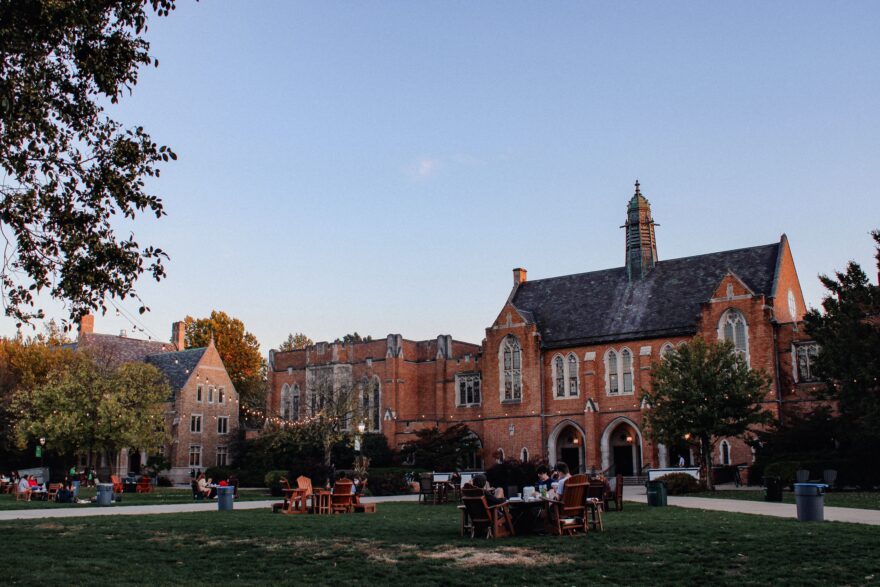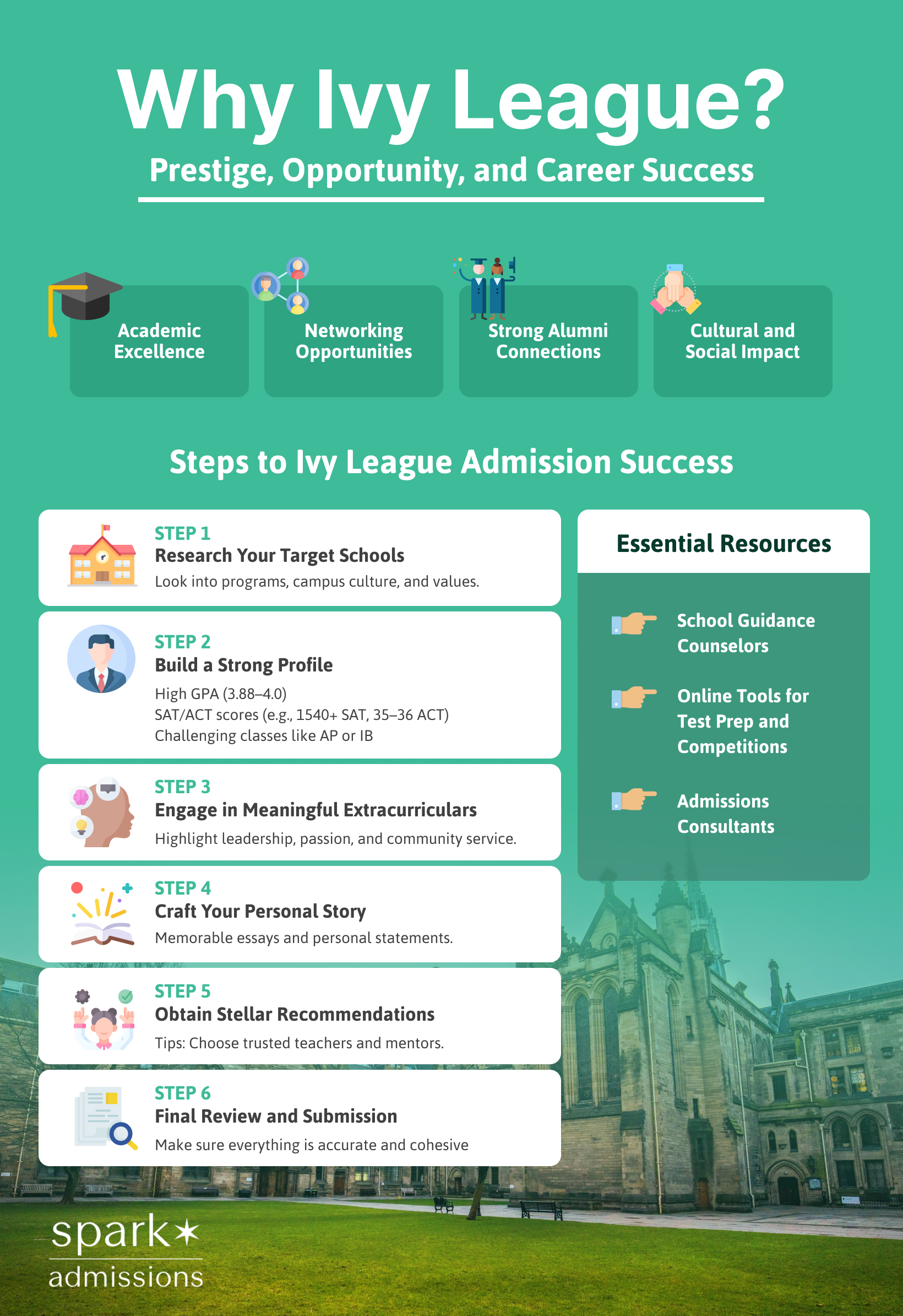- Blog
- > Ivy League Admissions
The Ultimate Guide on How to Get into an Ivy League School
- Dr. Rachel Rubin
- | November 25, 2024

The allure of the Ivy League schools is clear. These well-respected universities have very low acceptance rates, showing how high their standards are. Getting into one of these top schools is not simple, but attending one of these schools helps tremendously with getting the best possible education and earning prestige that will help open doors and ensure a successful career.
This comprehensive guide will help you understand the Ivy League preparation and application process better. It will provide useful tips and strategies to help you demonstrate your best self and improve your chances of acceptance.
Understanding the Prestige of Ivy League Schools
What makes the Ivy League so attractive?
The Ivy League is made up of eight private universities: Brown, Columbia, Cornell, Dartmouth, Harvard, Princeton, the University of Pennsylvania, and Yale. These schools are known for their tough academic programs. They have produced many of the foremost leaders in every aspect of society. Thanks to their great professors, top-notch resources, networking opportunities, and strong alumni connections, they offer top-notch postgraduate opportunities and career potential.
An Ivy League education brings more than just classroom benefits; It helps open doors to special networks, internships, and job opportunities. Having an Ivy League degree on your resume can really help you stand out in the job market and apply to top graduate programs.
Defining Ivy League: More Than Just Academics
Ivy League schools are known for their academic excellence, but they offer much more than just top education. These prestigious institutions are lively places for intellectual curiosity, cultural exploration, and personal growth.
The campuses of Ivy League schools are full of energy. They blend tradition with innovation. Students are encouraged to think critically, consider new ideas and perspectives, and be challenged by their professors and peers. The ability to form relationships with professors, to conduct leading-edge research, gain access to the best internships and employers in the country, and form lifetime bonds with fellow students is unparalleled.
Additionally, these schools have a diverse student body. This brings together many different backgrounds and those with a wide range of academic interests, creating a rich atmosphere for cultural exchange and global awareness. Students learn to be caring and active members of the world.
The Cultural and Social Impact of Ivy League Institutions
Ivy League schools have a big impact beyond their campuses. They change cultural and social ideas both in the United States and around the world. These schools help advance learning, research, and public services through their research expertise and thought leadership. They shape policies, improve knowledge, and support innovation and the betterment of society.
The research from Ivy League schools leads to important discoveries that impact medicine, technology, and how we see the world. Their researchers and alumni work on major issues, like climate change and social justice, aiming to solve big problems in society.
Ivy League schools also help steer public discourse and culture. As such, many Ivy League alumni are influential in areas like government, business, media, and art. They help shape stories and make changes worldwide.
Preparing for the Ivy League
The path to getting an Ivy League acceptance letter starts well before you send in your application. You need to plan carefully, work hard, and strive for excellence throughout high school and through your extracurricular pursuits.
First, think about your strengths and what you like as early in high school as possible. Figure out what subjects you enjoy, and develop a deep list of extracurricular activities in school and in your community. This important self-reflection will help you develop leadership skills throughout high school. It will aid you in making smart choices about your classes, activities, and tests.
Essential Resources Every Aspiring Ivy Leaguer Needs
You need a good set of tools and discipline to succeed in an Ivy League school. These tools will help you keep up a high school GPA, get ready for tests, build a great profile with your activities, and write impressive essays.
Here are some resources you can utilize:
- Guidance Counselors: Your school counselor can give you helpful advice on which classes to take, what activities to get involved in, and how to go through the application process.
- Online Resources: Search the web for ways to get more involved in your chosen academic area of interest. There are countless organizations, programs, and competitions that can help you build the type of resume that Ivy League colleges are seeking from their applicants.
- Admissions Consultants: Think about hiring an Ivy League admissions consultant with a proven track record. The earlier in high school, you can form this relationship, the better. They can give you personalized, strategic, expert guidance to make your application stand out.
Always remember that having a solid support system is very important. Feel free to ask your teachers, mentors, or family for help and motivation throughout this journey.
Building a Strong Academic and Extracurricular Profile
When Ivy League admissions officers look at candidates, they want to see students who are not just good at studying. They also want to find those who truly enjoy learning and want to make a difference. It is very important to have a strong academic record. However, it is just as important to have a rich extracurricular resume.
During high school, challenge yourself with the most challenging classes. Try to keep a high GPA. Sign up for Advanced Placement (AP) or International Baccalaureate (IB) classes if they are offered at your school. In addition to your grades, take part in classroom discussions. Show your interest in learning and look for chances to expand your academic skills.
Extracurricular activities are a great way to discover your passions. They help you gain valuable skills and show your ability to lead. Choose activities that you really enjoy. This could be sports, music, community service, entrepreneurship, or scientific research, among many other areas.
Applying Early to Increase Admission Chances
Many Ivy League universities give students the choice to apply using Early Decision (ED) or Single-Choice Early Action (SCEA). These options let students apply early in the admissions process. They may even increase their chances of admission. However, it is important to know the differences between these options.
Early Decision is a binding choice. If you get accepted through ED, you must attend that school. This means you have to pull back any other applications you sent. On the other hand, Single-Choice Early Action is not binding. It lets you find out if you are accepted early, but you do not have to commit and can still apply to any other school you would like in the regular decision round.
Applying early can give you an edge. It shows that you really want to attend that school. Also, at many schools, a high percentage of the class earns admission through the early round. However, make sure your application is strong and ready. You will have less time to fine-tune it than if you apply by the regular deadline.
Crafting a Holistic College Application Strategy
Your Ivy League application is more than just your grades and test scores. It tells the story of your journey, dreams, and abilities. It’s important to take a complete view when creating your application to show admissions committees what makes you special.
A strong application shows how your academic work, activities outside of school, personal growth, and future plans connect with one another. It shares not only what you have done but also who you are and what inspires you. It shows how you will add to the university community. Most importantly, it should demonstrate why you are unique and convey a story about who you are beyond your grades and test scores.
Think of your application as a tapestry made from your experiences, interests, thoughts, and personality. Each part—your essays (both the Common Application essay and the school-specific supplemental essays), recommendation letters, and activities—should work together to tell a cohesive and memorable story about you.

Step-by-Step Guide to the Ivy League Application Process
Applying to Ivy League schools can take time and effort. However, you can make it easier by dividing the process into simple steps. This will help reduce your stress and help you submit a great application.
Preparing well, paying attention to details, and showing your true self throughout the Ivy League application process are important.
Step 1: Research and Shortlist Your Target Ivy League Schools
Before starting the application process, research the Ivy League schools that fit your academic interests and career goals. Each Ivy League school has a unique character, culture, and strengths in different programs.
Visit their websites, look at the majors offered, the course requirements, and the course lists, and check out faculty pages. Read their mission statements and values, and research their social activities. Think about things like location, campus size, and diversity among students. These aspects can greatly affect your experience.
After you collect enough information, make a list of 3-5 Ivy League schools that appeal to you the most. Remember, do not feel the need to apply to all eight schools. Instead, focus on the ones where you can see yourself doing well, both in your studies and in life.
Step 2: Understand the Admissions Criteria
To create a strong application, you need to understand the admissions requirements of the Ivy League schools to which you want to apply. While each school is different, they have some things in common in terms of the level of academic rigor and extracurricular accomplishments they are seeking in their students.
Ivy League admissions officers look for students with great academic skills, a strong work ethic, and a proven track record of impacting their communities for the better. They appreciate curious students who show leadership and love to learn.
Be sure to check the admissions requirements on each school’s website. Get to know what they ask for in the average weighted GPA, standardized tests (like the SAT or ACT), activities outside of school, recommendations, and essays. Also, watch for any special opportunities, like video interviews or portfolio submissions.
Community Service is a Must for Ivy League Schools
Being a positive influence in and caring for a meaningful part of the community is crucial for Ivy League admissions or for admission to any top colleges. What is most important is showing a long-term, regular commitment to a particular organization. It’s not about earning community service hours. It’s about getting deeply committed to an important cause. Ivy League colleges and other top universities want students who are deeply invested in the welfare of others and will continue to show this dedication in their college communities and after college as well.
Step 3: Excel in Standardized Tests (SAT/ACT) and Focus on GPA
Achieving high test scores holds significant weight in the admissions process for Ivy League schools. It is imperative to dedicate oneself to rigorous preparation for the SAT or ACT exams in order to showcase one’s academic prowess. These standardized tests serve as pivotal criteria in the evaluation process conducted by admission officers. Many of the Ivy League schools have returned to requiring standardized test scores. In addition, even those who remain test-optional still prefer students who submit test scores.
Devote ample time to diligent study and completion of practice exams for the SAT or ACT to optimize performance.
Exceptional scores, coupled with a stellar high school GPA, can greatly enhance the likelihood of securing acceptance. Leverage these assessments as a platform to demonstrate your academic strengths and leave a lasting impression on the admissions committee.
SAT/ACT Score Goals
Aiming for the higher end of the SAT and ACT score goals range is crucial as this can significantly enhance your chances of being accepted into your desired college or university. For instance, Ivy League institutions typically expect applicants to achieve a score of 35 or 36 on the ACT or a minimum of 1540 on the SAT. While we’ve worked with some students who have gained admission with lower scores, meeting these high standards can make a substantial difference in the competitive admissions process.
That said, earning these scores alone will not get you into an Ivy League college, as they are looking for so much more than just grades and test scores.
Scoring at the top end of the range showcases your academic abilities and demonstrates your commitment to excellence. Admissions officers often use standardized test scores as one of the factors to assess an applicant’s readiness for college-level coursework. Achieving exceptional scores can set you apart from other candidates and strengthen your application.
Here are some tips for success:
- Prepare diligently for these exams through practice tests, review materials, and possibly tutoring to help you reach your target scores.
- Focus on mastering key concepts and test-taking strategies to improve your performance on test day.
Remember that while standardized test scores are essential, they are just one component of a holistic admissions review process that also considers factors like GPA, the rigor of your classes, extracurricular activities, demonstration of leadership, essays, and letters of recommendation.
GPA Requirements
With over a decade of experience helping students get into Harvard University, Yale University, Princeton University, Cornell University, Dartmouth College, University of Pennsylvania, Columbia University, and Brown University, it has become clear that there is a desired GPA range that will get the admissions officers to put you in the pile for consideration or not. While we generally see students with unweighted GPAs between 3.88 and 4.0 gain admission, the closer you are to a 4.0, the more likely you are to get admitted.
Yes, that means getting all A’s or very close to all A’s in high school (and that means A’s and not A-’s).
I reference unweighted GPAs because weighted GPAs become hard to interpret. I’ve found that every high school weights differently, so it isn’t easy to interpret a weighted GPA. However, as you can imagine, Ivy League colleges care a great deal about the difficulty of classes you are taking. The Ivies are going to want to see that you have challenged yourself to the greatest extent possible at your high school by taking the hardest classes available to you. This means that you have taken a high percentage of the AP classes your high school allows or offers and have also taken honors and advanced classes. Colleges will look at the difficulty of your courseload and will give you a rigor score to go along with looking at your unweighted GPA.
Send Your Scores Even If The School is Test-Optional
Currently, Ivy League colleges are mixed on whether they require test scores or are test-optional. With that said, it is much easier to gain admission even at test-optional schools if you have a test score, though it is important only to submit strong test scores.
Ivy League colleges will be more likely to accept test-optional students if they are socioeconomically underprivileged or if they have other important qualities that the university is seeking.
Step 4: Craft Compelling Personal Essays
Your personal essay is a great chance to set yourself apart from other qualified applicants. It gives you the opportunity to share your unique story, personality, and goals with the admissions committee. This helps create a lasting impression, and the Common App essay should not be about your academic goals. This is a personal essay about who you are.
Your school-specific supplemental essays should reflect who you are, what drives you, and why you want to attend that specific Ivy League school. Use clear images, interesting anecdotes, and deep thoughts to highlight your personality, values, and desire to learn in supplementary essays.
Keep in mind that your essays should not list your accomplishments, as that is what the Common Application’s Activities Section is for. Instead, your essays should show your character, growth, and your specific goals.
Let your true voice shine through. Show your passion for learning and your dedication to making a positive difference in the world.
Step 5: Secure Influential Letters of Recommendation
Letters of recommendation are critical. They give outside opinions on how motivated you are, how you treat others, and what distinguishes you from your peers. These letters share details about your character, work habits, and how you help in school and the community.
Pick recommenders who know you well. They should be able to talk about your strengths and achievements. Build strong relationships with teachers, counselors, and mentors. They can write personal letters that support your Ivy League goals.
Make sure your recommenders have enough time to write good letters. Give them your resume, transcript, and any details about your goals. This will help them write strong letters that show your unique qualities. Most teachers and guidance counselors will have you complete a questionnaire before they write a recommendation for you, and spending significant time providing them with details in the questionnaire will result in a stronger recommendation.
Also, many schools allow for recommendations from “Other Recommenders.” These are mentors, club supervisors, coaches, employers, and more. These people can really help give insights into your leadership and character.
Step 6: Final Review and Submission of Your Application
As the application deadline gets closer, take the time to look over your application very carefully. Make sure everything is accurate and cohesive. This final check is important. It helps you show your best self to the admissions committee.
Proofread all your essays, short answers, and activity descriptions closely. Check for grammar, spelling, and punctuation mistakes. Look over your transcript to find any errors, and make sure your test scores are correct.
Ask a trusted teacher, counselor, or mentor to review your application for their feedback and tips if you can.
Once you feel good about the quality of your application, be sure to submit it before the deadline. Remember, sending a neat and well-prepared Ivy League application shows your commitment and boosts your chances with the admissions committee.

The Role of Extracurriculars in Ivy League Admissions
While great grades and test scores are important, Ivy League admissions officers also look for students who are passionate and involved outside the classroom. Your activities show your interests, leadership skills, and desire to improve the world.
Quite frankly, the biggest differentiator between those who are admitted to Ivy League colleges and those who are not is based on one’s resume.
Don’t just try to add more activities to your resume. Instead, focus on an area that you are passionate about, such as sports, music, an academic area of interest, helping the community, debating, or conducting scientific research. Aim for depth in what you do. Show that you truly care about and are committed to your interests.
What Types of Activities Make an Impact?
When Ivy League admissions officers look at extracurricular activities, they want to see signs of leadership and initiative. They also value intellectual curiosity and a real wish to make a difference. Activities should show that you are committed and passionate about what you do.
They especially like activities linked to learning, such as joining academic clubs, going to summer programs at colleges, learning a foreign language, helping advocate for an important cause, or doing independent research projects.
Helping others and positively affecting your community is also very impressive. Volunteering for a cause you care about, taking part in advocacy work, or even starting a community service group are excellent ways to showcase your commitment to making an impact.
The best extracurricular activities are those that match your passions, show your special talents, and point out your ability to contribute to the world in a meaningful way.
Leadership, Initiative, and Making a Difference
Leadership does not always mean having a formal title. Ivy League admissions officers know that you can show leadership in different ways. This includes taking the lead on group projects or inspiring others through your work in the community.
Don’t hesitate to step outside your comfort zone. Embrace challenges and look for ways to lead, like being the captain of a sports team, starting a club, or organizing a fundraiser. Showing that you can take the initiative and accept responsibility are important traits for Ivy League admissions.
Keep in mind that the best applications highlight not just what you have done but also who you are, how you have grown, and what you can achieve in the future. Look for chances to lead, be creative, and make a real impact in the world.
The Importance of Personal Traits in Ivy League Admissions
Students’ personal qualities are one of the most distinguishing factors in deciding who Ivy League schools admit. At Spark Admissions, we work with students throughout high school to help them develop these very important personal traits.
So, how do Ivy League colleges evaluate these traits?
Ivy League colleges have a tremendous amount of school-specific essays, and many of the schools conduct interviews or ask for a 2-minute video. Through essays, interviews, and videos, students can showcase their unique qualities to Ivy League colleges. Their questions are aimed at better understanding a student’s personal qualities, which can make them stand out among the greater pool of applicants. Some of the qualities Ivy League and other competitive colleges want to see in successful applicants are:
- Being an open, considerate member of the community who is willing to embrace the diversity of their peers on campus.
- Showing that your intellectual curiosity is great enough that you can share interesting ideas with others in the classroom and beyond.
- Demonstrating that you will get involved on campus and be a large contributor to some of the many student organizations and extracurricular activities on campus.
- Exhibiting that you are empathetic to others and would be a good roommate.
- Discuss how you hope to impact society with your leadership skills and individual interests.
Impact of Legacy Status on Ivy League Admissions
The legacy preference in college admissions, especially at Ivy League schools, has been discussed a lot lately. Legacy status usually means that a student has a parent, grandparent, or sibling who attends or has graduated from that school.
People often argue about how much legacy status affects admissions. Many think it might give legacy applicants a bit of an advantage in the process. Still, it’s important to remember that having a legacy status alone is almost never the main reason for getting accepted, as a student would still need to meet all of the criteria for admission.
The Role of Interviews in Ivy League Admissions
Interviews are not always needed by all Ivy League schools. However, they can be a great chance to speak with an alumnus of the school and learn more about their experiences. This is your moment to show your interest, personality, and why you would be a good fit for the school.
If you get an interview, see it as a way to add to your application. Show your excitement and real interest in the school. Talk clearly about your thoughts and experiences. It is important to be ready—look into the school in an in-depth manner, think about your experiences and goals, and practice answers to common interview questions.

Navigating Financial Aid and Scholarships
The cost of going to an Ivy League school can seem overwhelming. However, you shouldn’t let money issues stop you from getting the education you want. These prestigious schools aim to help talented students from all backgrounds, and many of the Ivy League schools will cover 100% of their financial needs, which they can do because of their large endowments.
Look into the financial aid options at your chosen schools. This includes need-based help, grants, scholarships, and work-study programs. Also, feel free to contact the financial aid office. They can offer guidance and support.
Understanding Need-Based vs. Merit-Based Aid
Understanding financial aid can be tricky. However, it is important to know the difference between need-based and merit-based aid when looking for help to pay for your Ivy League education.
Need-based financial aid is given based on your family’s money situation. This type of aid helps cover the costs of attending school based on what your family can pay. It often includes money that you do not have to pay back, like grants and loans that need to be repaid.
Merit-based aid, on the other hand, relies on your grades, talents, or other special skills. You usually get this aid in the form of scholarships that also do not need to be repaid.
However, Ivy League colleges do NOT give merit aid. Everyone they accept is brilliant. It tends to be lower-ranked colleges that provide merit aid. For Ivy League colleges, or any other colleges for that matter, please use their online net price calculator (which is all available on their website) for each school to estimate what a financial aid package might look like, given your family’s financial situation.
Tips for Successful Scholarship Applications
Securing scholarships can significantly reduce the financial burden of pursuing an Ivy League education. While the competition for scholarships can be fierce, crafting compelling applications that highlight your unique strengths and aspirations can increase your chances of success.
| Tip | Description |
| Start Early | Begin your scholarship search early in high school and create a timeline for applications and deadlines. |
| Tailor Your Applications | Carefully research each scholarship and tailor your application to their specific criteria and values. Highlight experiences and achievements that align with their mission. |
| Craft Compelling Essays | Your essays are your opportunity to showcase your unique voice, personality, and aspirations. Use vivid language, engaging anecdotes, and thoughtful reflections to make your application stand out. |
| Seek Strong Recommendations | Request letters of recommendation from teachers, counselors, or mentors who can speak to your strengths, abilities, and potential. Provide them with ample time and materials to write compelling recommendations. |
| Proofread Meticulously | Carefully review all application materials for grammar, spelling, and punctuation errors. A polished and error-free application reflects your attention to detail. |
| Don’t Give Up | Apply to a wide range of scholarships, even if you don’t meet all the criteria. You never know what opportunities may arise. |
BONUS: Practical Tips for Ivy League Admissions from Recent Admits
- Find what you love and participate in several activities in that area with all your energy. Ivy League schools want people who are experts in a given area, not those who do a bit of everything.
- Don’t be scared to show your true self in your essays. Tell your story in a real way. Show how you have grown and become stronger.
- Talk to current students or alumni. They can give you insights into the school culture and some good advice.
- Use every chance to push yourself in school and in life. Try to do things that make you uncomfortable.
- Trust in yourself and what you can do. The Ivy League application process is tough, but with hard work and commitment, you can achieve your goals.
Begin Your Journey Toward Acceptance At The Ivy League School of Your Dreams
Getting into an Ivy League school requires a well-informed strategic plan. This plan should focus on doing well academically, being active in extracurricular activities, writing strong personal essays, and getting good letters of recommendation. It helps a lot to start preparing early. This includes scoring high on tests and developing a very strong extracurricular profile.
You should also understand that the Ivy League schools expect you to achieve in every area we have discussed. Students admitted to Ivy League schools have the highest grades, the strongest rigor, the best resumes, incredible leadership, high standardized test scores, fantastic recommendations, and unique and compelling essays. If you carefully follow this guide, you can improve your chances of getting into these elite schools. Good luck with your Ivy League goal!
If you want to maximize your acceptance opportunities, schedule a free consultation with Spark Admissions.
Frequently Asked Questions
Can International Students Apply to Ivy League Schools?
Absolutely! Ivy League admissions accept applications from international students. The application process is mostly the same. However, international students might have to meet extra requirements, like taking English language proficiency tests such as TOEFL or IELTS.
What qualifies a school to be in the Ivy League?
Ivy League schools are known for their academic excellence, prestigious reputation, and selective admissions process. To be considered part of the Ivy League, a school must meet certain criteria, such as being an institution with a long history of academic success, having a strong emphasis on research and scholarship, and maintaining a high standard of excellence in all areas of education. Additionally, Ivy League schools also have a strong focus on extracurricular activities, community service, and leadership development. Ultimately, being in the Ivy League is not just about academic achievement, but also about fostering a well-rounded and intellectually curious student body.
What are the average Ivy League acceptance rates?
According to data from recent years, the acceptance rates for Ivy League universities range from around 3% to 7%, with Harvard University typically having one of the lowest rates at around 3.6%. Other schools like Yale and Princeton have acceptance rates of around 3% to 4%, while Cornell has a 7% admissions rate, and Brown has a 5% admissions rate. These numbers highlight the highly competitive nature of admissions to Ivy League schools and emphasize the importance of academic excellence, extracurricular involvement, and strong personal essays in the application process.


